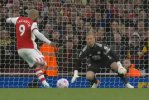santa sangria
RefChat Addict
This is illustrating my point.Of course there is. For starters, just look at any one of the absolute plethora of paradinha penalties that led to this being adopted in the first place.
Here's a classic example from Neymar, one of its main proponents.
The effect of Lacazette (?) feinting during his run up was to make the GK dive early. That's what happened.
You can nit-pick about which step it was or whether it was at the end or not... but the action and outcome are the same, That's why the law is soooo daft.
IMHO of course





